New Zealand aid group to DPRK gets raided, records seized due to pressure from U.S. | By Gregory Elich (Fall 2020 issue)
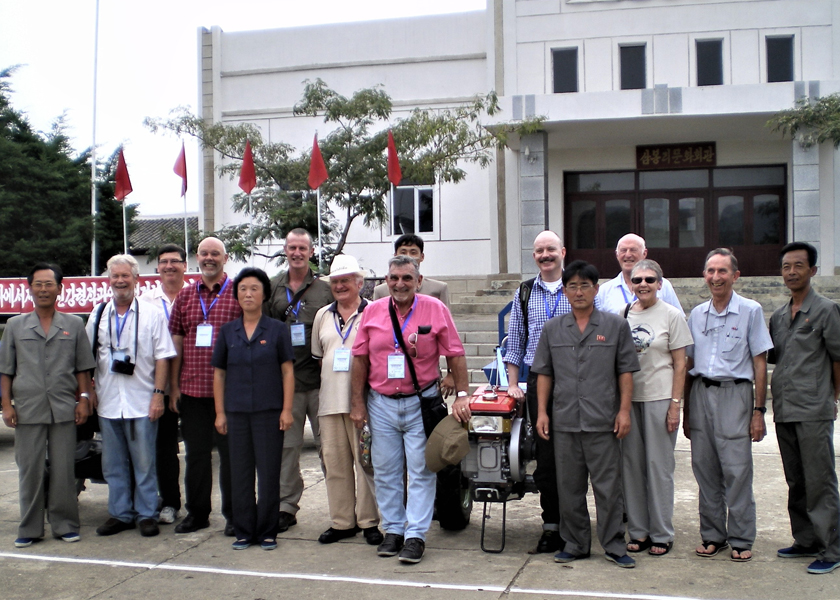
One New Zealand aid organization recently got its bank accounts shut down, its offices closed, records seized, and staff interrogated for making a donation to COVID-19 control and prevention in North Korea.
But the source of that pressure was only indirectly from the New Zealand government. In fact, the enforcement action was a direct result of the U.S. government sanctions on North Korea.
This year, the New Zealand-Democratic People’s Republic of Korea Society (NZ DPRK Society), apparently fell afoul of the U.S.-driven effort to strangle the North Korean economy when it provided the DPRK with some funding to help with personal protective equipment to combat COVID-19 pandemic. Even more illogical was that the sum of money at the center of this furor was only $2,000.
Peter Wilson, the Society’s secretary, related the history of his long-standing and experienced organization’s work. His group’s experiences with sanctions pressure demonstrate how these new regulations have backfired and stymied the efforts of many aid organizations to provide help during a time of need.
Wilson is an agricultural specialist with 50 years’ experience planning and implementing humanitarian projects in 21 countries in the Asia/Pacific region, including North Korea, ranging in cost from a few hundred dollars up to $32 million.
The NZ DPRK Society established in 1972, provides aid and facilitates educational exchanges with North Korea. Its projects included providing farm equipment, diesel fuel, flood relief, and fertilizer to a project there known as the NZ Friendship Farm, supplementary food to the SeungHo Home for the Elderly, and multiple shipments of medical supplies, among others.
United Nations sanctions and U.S. sanctions prohibit almost all trade and transactions with North Korea, resulting in punishment of the entire population, especially the poorest and most vulnerable.
Ostensibly, humanitarian aid is exempt from sanctions. Still, many humanitarian groups have had to curtail or halt assistance to the DPRK, due to controls around and infractions related to these sanctions. U.S. officials regularly contact officials abroad, urging them to crack down on businesses, organizations, and individuals having any dealings with North Korea.
Wilson said the NZ-DPRK Society’s main activities include informing the New Zealand public and government about the predicament in North Korea, carrying out people-to-people initiatives, and “providing what modest help we can by implementing small projects or gifts of aid,” Wilson said.
There has been mixed success, he added. Politicians, relevant government agencies and the general public are all subject to a “huge anti-North Korea propaganda effort,” he said. “Most people in the public sphere or those in government can’t be bothered to take any interest, so we have not done so well in our efforts to inform the New Zealand public and government.”
The society’s people-to-people initiatives have included cultural group exchange visits in the ‘80s and ’90s, placing the first Western teacher in a DPRK school in 2006, sponsoring guest lectureships at Pyongyang universities, and sponsoring study tours to New Zealand for North Korean teachers and university lecturers.
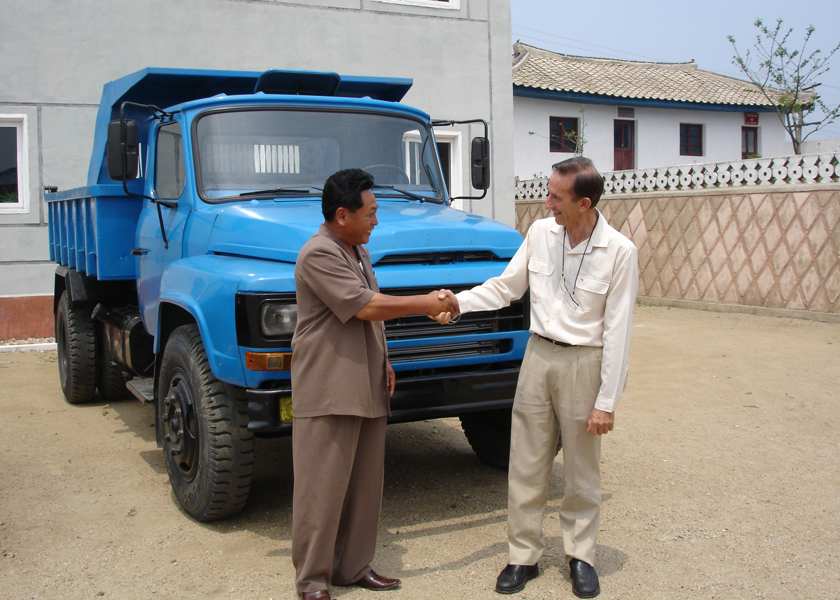
The society has successfully sent equipment to the Friendship School, flour to the Bongsu Church Bakery (which provides noodles and bread were to the elderly), containers of antibiotics and other drugs, hospital equipment (the equipment could not be delivered due to UN sanctions), and flood relief aid to various sites, and tractors, trucks, diesel fuel, and fertilizer for the Friendship Farm.
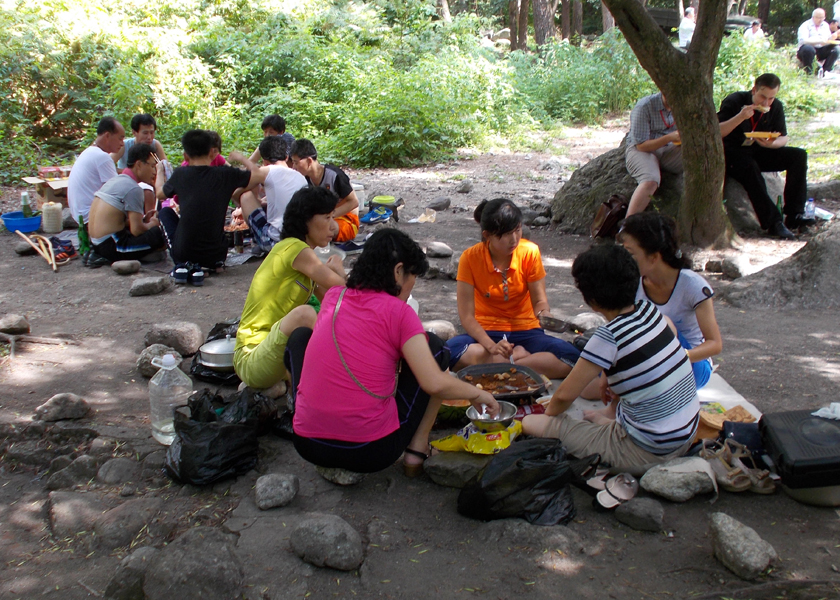
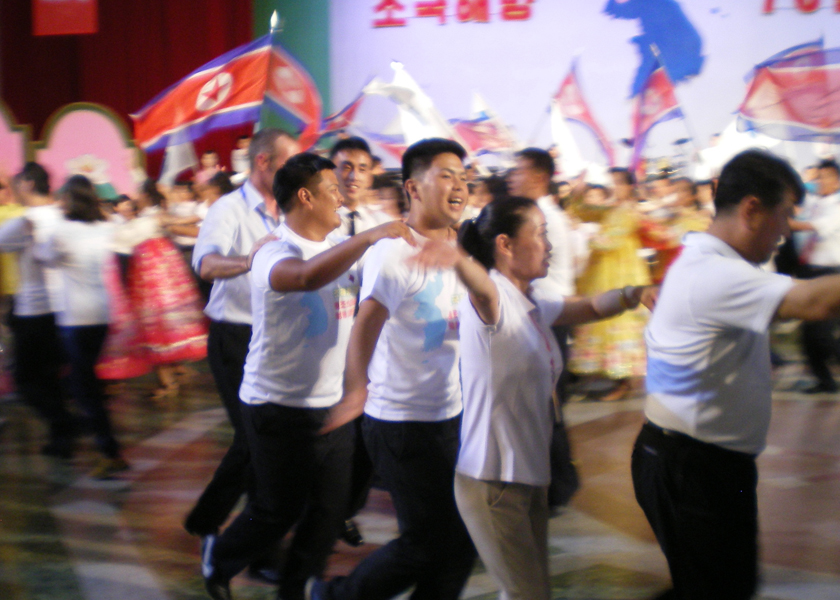
In addition to helping a variety of aid projects, carrying them out “provides a lot of personal satisfaction to the individuals involved at both ends,” he said. “All the time, each side is learning a little more about the other, and bonds of personal trust and friendship are strengthened, which is a good thing.”
At home, the Society helped to lobby for New Zealand to establish diplomatic relations with the DPRK, which a Labour (liberal) government did in 2001. However, the subsequent National (conservative) government wound that back and totally froze all diplomatic contact in 2015, according to Wilson. Contrary to its expressed intention, the 2017–2020 Labour Party-led government did not restore diplomatic relations, he added. “Everything points to (at that time) Secretary of State Rex Tillerson having pressured our prime minister and foreign affairs minister to support him in a policy of isolation.”
Wilson has also been influential in helping new visionaries start their own projects to help North Korea. About 11 years ago, he said, he received an inquiry from Geoffrey See of Singapore who went on to found Choson Exchange, an organization that brings experienced business professionals to North Korea for workshops in business practice and marketing. “With our then-40-something years’ background in joint projects, I made the right connections for him,” he said.
In 2012, Wilson said, he got a call from a Korean American woman. “Three years earlier, she had had a dream and a vision of women doing a peace march across the DMZ,” he said. His group had recently completed an “epic, groundbreaking project in which a bunch of Kiwi motorcyclists rode their bikes through Siberia into and across the DPRK, through the DMZ, and over the length of the ROK,” and the woman, Christine Ahn, had heard about it. She proposed her idea to him, and he replied “I believe it is eminently doable,” Wilson recalled.
Wilson worked with Ahn for 15 months, to ensure she would realize her vision. On May 24, 2015, Ahn and 29 women activists from many countries walked to the passport office in the middle of the DMZ, and crossed over to South Korea in an act of international solidarity and peacemaking. Wilson remembers the moment of deep emotion as he watched the women achieve their goal.
These days, Ahn is spearheading a global women’s peace initiative through her WomenCrossDMZ organization and other global women’s peace organizations, with the goal of achieving a peace treaty that formally ends the Korean War.
“I am in absolute awe at what Christine has accomplished with WomenCrossDMZ since then,” Wilson said. “The impact of what Geoffrey and Christine are doing is immense. What they are accomplishing is huge, way beyond anything the NZ DPRK Society has ever done or is ever likely to. It is a nice feeling knowing that we were able to help them get started.”
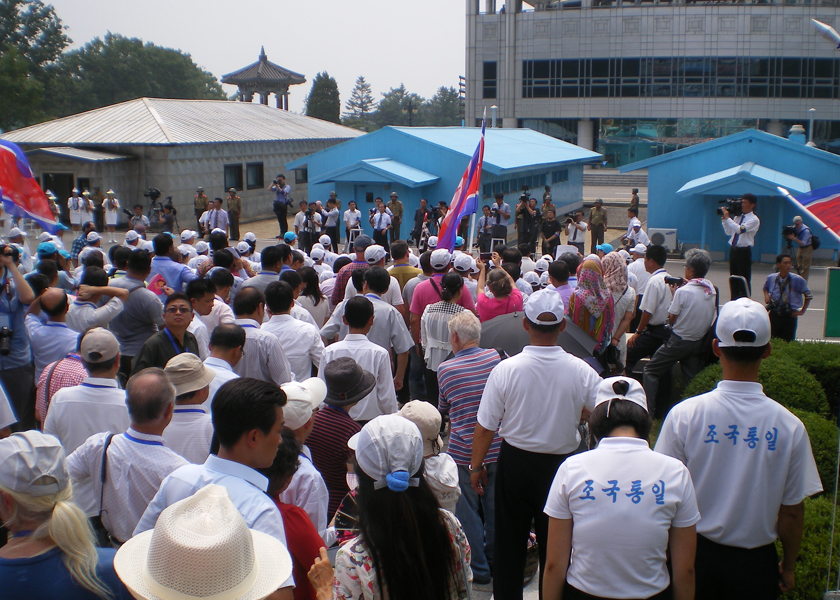
Wilson’s organization continues to be possibly the most active of the perhaps 50 or 60 groups known in the DPRK as “friendship societies.” Some just write letters, he said, while others like his group, are engaged in aid work at all times.
“It is true to say that New Zealand is held in very high regard in Pyongyang, indeed throughout the DPRK,” Wilson said, due to its many successful aid initiatives. Wilson gives credit to their counterpart DPRK group, the Korea-NZ Friendship Society. “I admire them greatly because they have been willing to risk the stalling of their careers by sticking their necks out and trying new things,” he remarked.
Being in the business of supplying aid to North Korea has always had its ups and downs, but has been more difficult in recent years, since sanctions became more onerous.
Before email, things were slower because they proposed projects by letter, and had to wait patiently for a letter by postal mail. Faxes speeded things up, and email was a big improvement, he recalled. “For all projects, right from the start, the NZ DPRK Society worked up the project in discussion with our counterparts,” he said, and “once it was agreed to …we just went ahead and did it, whatever it was.
In 2005, Wilson said, he opened up a bank account in Pyongyang to buy a tractor for the Friendship Farm, with no issues. Around 2006, however, “the U.S. Department of Treasury told banks around the world that if they did any business with North Korea, they would be stopped from doing any other foreign exchange transactions using the U.S. dollar.” That stopped them from using that account any more “Since then,” he said, “somebody has always carried money for projects by hand to Pyongyang.”
In the case of the recent notorious $2,000 payment for COVID-19 relief, they would have normally entrusted the money to someone visiting on behalf of the organization, but the pandemic made such visits impossible. “We found another route to channel the money,” he said, “and this is what has caused us the trouble.”
There was money reserved for a six-week visiting scholar program from North Korea to New Zealand. Because of the pandemic, it was not going to happen in 2020, Wilson said. The three trustees of the scholarship fund jointly agreed to fund the COVID-19 relief the government requested, for $2,000.
Wilson said they sent the money through the DPRK embassy in Jakarta, Indonesia on March 5. It all went smoothly, and “my counterpart in Pyongyang acknowledged receipt a few days after that,” he recalled, and they got a receipt from the DPRK Red Cross, the final destination of the funding. “It was an urgent request and we felt pleased that we had been able to respond quite quickly.” They eventually got some photos of the testing kits and other items being distributed, and issued a press release about it June 4.
About a month after that, Wilson related, he got a phone call from the bank, saying that they were doing a “routine audit” of some international money transfers. Wilson sent them a link to the June 4 press release “saying we had sent the money through an intermediary in Indonesia,” he said.
After that, he said, a senior bank manager called to ask a lot more questions. “They wanted to know the details of every transaction since 2011,” Wilson said. At the same time, he related, his organization’s leadership learned that DPRK friendship societies in Sweden and Denmark had their bank accounts closed down. The NZ-DPRK Society cashed out their accounts and closed them down. The bank then asked them questions about why they closed the accounts.
“I pondered this for a few days,” Wilson said. He finally called the bank, asking what they knew and why he was being questioned about a transfer to Indonesia, a long way from North Korea. “To my astonishment,” he said, “she emailed the next day saying, ‘The New Zealand Police alerted us to your press release.’ A couple of days later, they closed our bank accounts.”
Wilson said they thought that would be the end of the matter. But they were wrong.
One day after that episode, Wilson answered his door to find three uniformed police and one plain-clothed, the senior officer. The senior officer’s business card named her the “investigator, Financial Intelligence Unit, New Zealand Police,” he said. The police were in his home for nearly two hours, and were courteous. “I was presented with an unsigned copy of the search warrant, which cited a breach of United Nations Sanctions (Democratic People’s Republic of Korea) Regulations 2017 (LI 2017/74) and clause 3.1 of the 1946 United Nations Act.”
The police also wanted post-2017 records. “I took them to my untidy office, lifted five file boxes of papers out of the cupboard, and a huge overstuffed file from the filing cabinet, and told them everything they might be interested in would be in them and on my laptop,” he said.
The senior officer then advised him she needed to ask questions, which he could refuse to answer and he could also be represented by counsel. “She had a list of free legal aid lawyers. I called our NZ DPRK Society legal counsel, who arrived within 25 minutes.” The counsel for the aid organization is Matt Robson, a former Minister of Corrections and Deputy Minister of Foreign Affairs in the New Zealand Parliament, now working in private practice. “I don’t think she expected anybody quite so high powered,” he remarked.
The investigator asked her questions. “On advice, I declined to answer,” Wilson said.
One officer walked out with a pile of paper about 10 inches high, plus a lot of other files – Wilson is not sure how much they took from his office. “They also took my laptop, cellphone, and notebook with phone numbers and all of my different passwords in it,” he said. They also went to another organization member’s home, the co-signatory to the bank account, and tied up his time for about an hour, taking his cellphone and laptop as well.
Wilson said he looked closely at the United Nations Act of 2017 that they cited. The regulation “runs to 39 pages,” he said. “Most of it is about arms, coal, petroleum products and stuff like that,” and there is also a clause about financial services saying that there can be no subsidiary of a New Zealand place of business in the DPRK, and that there can be no subsidiary of a financial service provider that is established in the DPRK. The regulation does not discuss aid work specifically.
“It is hard to see how giving some money to the DPRK Red Cross can be deemed a breach [of the United Nations Act prohibiting a DPRK beneficiary of trade or services],” Wilson said, adding “At the time of this interview, five days after the raid, it is still a mystery what the breach might be.”
Wilson said he has been “reflecting these past few days and marvelling at the reach of the anti-North Korea clobbering machine. That our tiny Society has had its bank account shut down and is under investigation for some unspecified breach of sanctions just tells me how tightly the noose is being drawn around the DPRK’s neck.”
After all, the activities of his organization are rather unremarkable in the grand scheme of things, Wilson said. “We are a nonentity, yet we are being clobbered for putting the paltry sum of $2,000 towards our fellow human beings in North Korea, to support efforts to protect themselves from the deadly COVID-19 coronavirus!”
It does not bode well for future aid work of well-meaning organizations, Wilson said “In itself, this is sad, but it is a sickening charade that this is being done in the name of the United Nations. What has humanity come to?”
Author’s note: The NZ DPRK Society’s website is https://sites.google.com/site/nzdprksociety/
Follow the NZ DPRK Society on Twitter at @DprkNz


